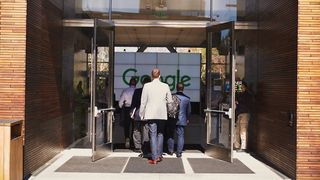News Media Alliance Underwhelmed By Google, Facebook ‘Fake News’ Efforts

News organizations are "underwhelmed" with efforts of Google and Facebook to combat fake news, which they define as "blatantly false information put into the public domain for purposes of shock value or to make a quick profit."
In comments to the British Parliament—specifically Damian Collins MP, the chair of the Culture, Media and Sport Committee in the House of Commons, which is investigating "fake news"—the News Media Alliance (NMA) said that Google and Facebook "exert enormous influence over which news articles reach the public and which languish in obscurity" and that they are not doing enough to make sure that real news, rather than fake, reaches that public.
Both those social media powerhouses have been urged to address the incentives for creating and perpetuating fake news, but the alliance says both have "undertaken underwhelming efforts to respond to this problem that appear to focus more on public relations" than addressing those incentives.
One thing the alliance wants Facebook to do is prioritize content in consumers' feeds from "organizations and premium publishers whose reporting demonstrates the principles of verification, accuracy and fidelity to facts."
It does point out that Facebook has launched a "Journalism Protect" initiative to "recognize and reward real news."
Google has said it is cutting off 20 "fake news publishers" from its AdSense advertising platform, but the alliance said it was still troubled by Google's "opaque" algorithm and how it ranks search results.
The alliance also has issues with Google's "first-click-free" option for publishers, which requires sites with subscription fees to allow a Google-searched document to be viewed free, though subsequent clicks on the site can be pay.
Broadcasting & Cable Newsletter
The smarter way to stay on top of broadcasting and cable industry. Sign up below
Google says that is a way to "help users find and access content that may require registration or a subscription." NMA says it is a way to deprioritize publishers who charge for content.
"Some publishers are taking steps to confront the first-click-free policy despite the risk of being deprioritized," it told the MP. "This will have a negative impact on consumers’ ability to find real news, and a compounding negative impact on publishers’ ability to raise revenue that funds real news. In essence, Google has effectively chosen which news articles will be seen and what business models will survive on the Internet, removing a customer’s choice from the equation."
NMA said the antidote to fake news is real news and that Google and Facebook need "to ensure this principle is reflected in their business practices."
NMA members include representatives of Gannett, Belo and Cox.
Contributing editor John Eggerton has been an editor and/or writer on media regulation, legislation and policy for over four decades, including covering the FCC, FTC, Congress, the major media trade associations, and the federal courts. In addition to Multichannel News and Broadcasting + Cable, his work has appeared in Radio World, TV Technology, TV Fax, This Week in Consumer Electronics, Variety and the Encyclopedia Britannica.

